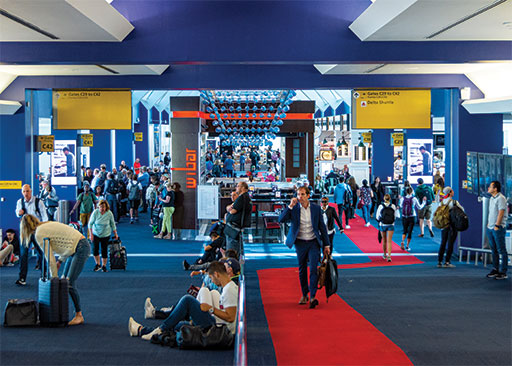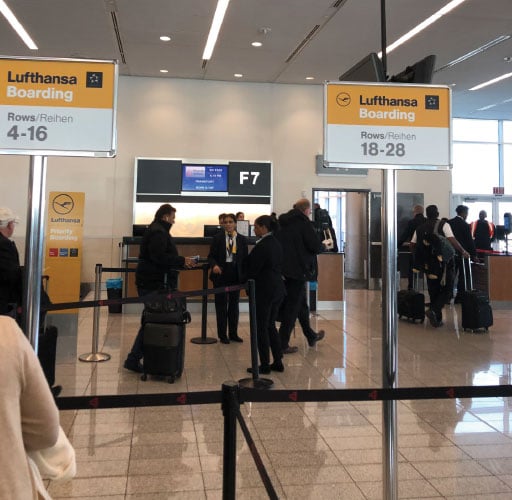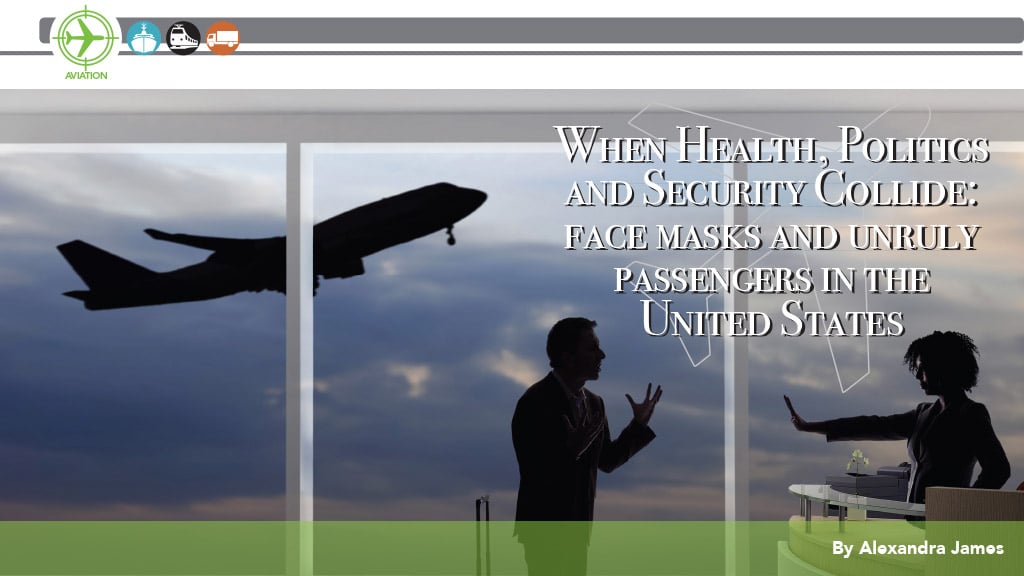Unruly passengers are not a new threat to aviation, but a combination of political and health factors have recently contributed to a perfect storm in the United States, resulting in an increased number of incidents across the country. Alexandra James, an aviation security analyst at Osprey Flight Solutions, examines these factors and offers some advice to operators.
The COVID-19 pandemic has led to unprecedented levels of disruption throughout the aviation industry and a myriad of challenges; from job losses stemming from travel restrictions and reduced passenger volumes to a new focus on hygiene measures, not to mention novel forms of criminal activity relating to test and vaccine certificate requirements and quarantine mandates. While it is true that the last year has seen the aviation security community pull together in incredible ways — one need only glance at social media and other online communities to find examples of individuals and companies reaching out and supporting one another — as per usual, it is cabin crew, our frontline in-flight safety and security professionals, who must deal with tensions in the isolation of the aircraft cabin.

While unruly passengers are a global issue, incidents on US flights have become so frequent that the administrator of the US Federal Aviation Administration (FAA), Steve Dickson, issued a statement on 16 March announcing that he would be extending the administration’s “unruly-passenger zero-tolerance policy”, which was initially introduced on 13 January. The policy change order, which had originally been dated through 30 March, directs airlines to take legal, rather than simply administrative, enforcement action against “passengers who assault, threaten, intimidate, or interfere with a crewmember in the performance of a crewmember’s duties”.
“…over 3,000 individuals have been banned from US airlines for failing to wear a face mask on board commercial aircraft…”
Significantly, the original order makes specific mention of passengers who fail to comply with crew instructions to wear a face mask, noting that while the failure to wear a mask was itself not a violation of federal law (at the time of issue in January), behaviour relating to such a failure that results in interference with cabin crewmember duties “will be subject to civil penalty”. However, since 2 February, a federal mandate requires face masks to be worn on all public transport, including inside airports and on board aircraft, with a USD 1,500 (c. GBP 1,095) fine for those who repeatedly violate the directive.
“… the wearing of masks became a politicised and divisive issue after then-President Donald Trump was perceived to be mocking individuals for wearing them and publicly questioned their efficacy…”
US national media reporting suggests that over 3,000 individuals have been banned from US airlines for failing to wear a face mask on board commercial aircraft since airlines began implementing mask requirements last year. This figure includes 950 from Delta (as of 2 February), 750 from United Airlines, 604 from Spirit Airlines and 448 from Alaska Airlines. Additionally, the FAA was cited as stating that more than 500 unruly passenger cases had been reported since late December, most of which involved passengers who refused to wear face masks. Here are some examples of unmasked passengers making headlines recently:
17 March: A brawl was sparked at a departure gate at Fort Lauderdale after three passengers were removed from a flight to Chicago by police and caused delays by refusing to wear masks;
9 March: A 24-year-old man on an Alaska Airlines flight from Seattle to Denver repeatedly failed to comply with requests to put on a mask, struck a member of cabin crew and urinated on his seat;
27 January: American Airlines removed 20 passengers, all members of the same family, from its Salt Lake City flight to Dallas, saying they violated the mask policy;
27 December: A JetBlue flight from Boston Logan International to Puerto Rico returned to Boston to offload a female passenger who became violent towards a crewmember who ordered her to wear a face mask and fasten her seatbelt.
Donald Trump, Face Masks and Unruly Passengers
It is worthwhile noting that some of the incidents listed above appear to involve passengers who violate the mask mandate in the course of other unruly behaviour, while others have been instigated by individuals taking exception to the mask mandate itself. In the US, the wearing of masks became a politicised and divisive issue after then-President Donald Trump was perceived to be mocking individuals for wearing them and publicly questioned their efficacy, at one stage announcing, “It’s voluntary. You don’t have to do it”. Consequently, the wearing of a face mask in the US has become an issue not only of biosafety but of identity and political affiliation. Health experts promptly linked Trump’s “negative or false assertions about face masks” with public resistance to anti-COVID-19 measures, with one study published in the International Journal of Health Sciences even suggesting that as many as 4,200 COVID-19-related deaths may have resulted from his comments.
Additionally, a significant number of unruly passenger incidents, many of which involving individuals refusing to wear face masks, were reported by airlines around 6 January, when Trump supporters gathered in Washington D.C. in order to protest the results of the election and disrupt the electoral vote-counting process, resulting in the storming of the US Capitol. Over the years, there have been many examples of commercial aircraft — which provide a literally ‘captive’ audience — functioning as a platform for protest. In the current context, one recent notable example took place on 5 January 2021 on American’s flight 1291 from Dallas Fort Worth International Airport to Washington Dulles International. A video was posted to social media of crew struggling to maintain control of the cabin as Trump supporters clashed with other passengers, and one individual used a mini projector to cast the words “Trump 2020” onto the wall of the darkened cabin. The following day, the Association of Flight Attendants, representing nearly 50,000 cabin crew at 17 airlines, issued a statement denouncing the “mob mentality behaviour” displayed on flights to Washington D.C. and calling for the disqualification of culpable individuals “from the freedom of flight”.
Continued heightened tensions surrounding the elections throughout January resulted in Capitol police being stationed at Washington D.C. airports in order to reinforce security from 29 January. In particular, following several cases involving passengers harassing lawmakers at airports and on flights, namely Lou Correa, Mitt Romney and Lindsey Graham, it was announced that several members of Congress had been provided with additional security while travelling to and from Washington D.C.

Regulation Variations, Exemptions, Confusions
President Joe Biden’s approach to addressing the spread of COVID-19, while not a ‘national mask mandate’ as such, has, to a certain extent, helped to unify responses across the country and, significantly, across airlines, by providing a legal apparatus to penalise passengers who flout the rules. However, while the federal mandate issued on 2 February requires all individuals to wear a mask in airports and on public transport, variation in general regulations between states, as well as the list of exempt individuals, may cause confusion and further aggression at airports and on flights. At the time of writing, thirty-three states continue to require individuals to wear face masks, while six (Iowa, Mississippi, Montana, North Dakota, Texas and Wyoming) have already lifted their state mandates and a further three (Alabama, Indiana and Utah) have announced they will be lifting theirs in the first weeks of April.
“…All aviation staff — whether they are cabin crew, a CEO, or a cleaner — have a duty to be alert, observant and engaged with their surroundings whenever they are in the terminal…”
Additionally, we have seen incidents stemming from confusion, on the parts of both airlines and passengers, around who should be adhering to regulations, and how. Individuals are being denied boarding because they’re wearing the wrong type of mask, for example, masks with valves, or wearing the right type of mask incorrectly, i.e. covering their mouth but not their nose. Also, recent headlines have highlighted incidents involving children and adults with disabilities being ejected from flights, despite presenting apparently legitimate doctors’ notes. To a certain extent, this confusion may be attributed to the order guidelines issued by the Centers for Disease Control and Prevention (CDC), which make provisions for certain travellers to apply for an exemption from wearing a face mask, with eligible travellers including those under the age of two and “a person with a disability who cannot wear a mask, or cannot safely wear a mask, because of the disability as defined by the Americans with Disabilities Act”. However, “The exemption is not meant to cover people with disabilities for whom wearing a mask might only be difficult or whose disability does not prevent them from wearing a mask or wearing a mask safely”, adding a certain level of complexity and subjectivity to the disability exemption application process, and further contributing to confusion at airports and on aircraft.
Conclusion and Recommendations
Of course, the issue of unruly passengers failing to follow instructions and comply with face mask mandates is by no means a purely American problem. There is a litany of cases being reported by airlines around the world involving individuals who either will not or cannot wear a mask, and tensions consequently arising, either between passengers or between passengers and crew, airline or airport staff. In order to support those individuals who are tasked with protecting aircraft and passengers — namely, cabin crew — airlines and airports should ensure that they are doing everything they can to reduce the possibility of incidents occurring in the air. As is the case with many issues facing aviation security, this comes down to three fundamental points: situational awareness, communication, and training.
While the pandemic has led to airlines and airports trying to reduce contact with passengers in order to limit the spread of COVID-19, face-to-face interactions are vital for ensuring that those boarding aircraft are both able and willing to comply with legal requirements. Such interactions also allow staff to communicate expectations and to monitor passengers’ behaviour. This in turn helps to ensure that those who are not compliant with mask mandates, those who are drunk or who are already displaying disruptive behaviour do not get on the aircraft.
All aviation staff — whether they are cabin crew, a CEO, or a cleaner — have a duty to be alert, observant and engaged with their surroundings whenever they are in the terminal, whether they are on duty or not. Airlines and airports also have a responsibility to ensure that everyone operating in the aviation environment is fully conversant with the procedures for reporting suspicious activity – remembering that ‘suspicious activity’ does not always relate to terrorism but to any type of activity that may impact upon operations, including unruly passengers.
Alexandra James is an aviation security analyst at Osprey Flight Solutions, which fuses real-time information, technology and industry-leading expertise to deliver advanced aviation risk analysis. She joined the company from Green Light where she was the sub-editor and regular contributor of Aviation Security International and also participated in delivering training in topics such as unruly passenger management (de-escalation and restraint techniques) and advanced interview techniques. Last year, she also completed a master’s degree in forensic linguistics at Cardiff University, with her dissertation focusing on communication between crew and aggressive passengers.
